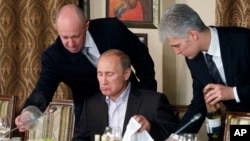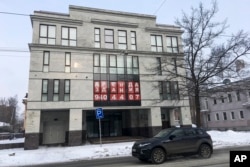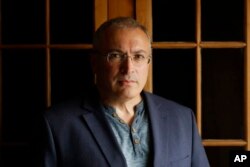A prominent exiled Russian opposition figure says recently leaked documents show Russian meddling in U.S. affairs was more sophisticated, ambitious and potentially more dire than the social media influence campaigns during the 2016 election.
First reported by NBC, the documents involve Kremlin-linked oligarch Yevgeny Prigozhin and other figures whom special prosecutor Robert Mueller has already indicted for interfering in the 2016 U.S. presidential election.
Released by Mikhail Khodorkovsky's London-based Dossier Center, the latest communications reveal a 2018 plot to radicalize African-Americans, stoke violence and train politically disaffected ethnic minorities to carry out domestic terror attacks ahead of the 2020 U.S. elections.
Khodorkovsky, a self-exiled Russian oligarch-turned-Kremlin opponent, told VOA's Russian service in a Skype interview that the material suggests a drastic escalation of Russian meddling in U.S. affairs.
"From a legal point of view, there are sufficient grounds to declare an investigation" of an international criminal conspiracy, Khodorkovsky said. "If I were an American citizen, I would say that my security rights are now being neglected."
No Kremlin response
The documents have not been forensically assessed by an independent third party, though the Dossier Center's own analysis seems to verify their authenticity. Widely published reports on the material by major Russian news outlets such as Novaya Gazeta have yet to prompt a Kremlin response.
NBC News contributor Frank Figliuzzi, a former assistant director of counterintelligence at the FBI who reviewed the documents, said they may represent nothing more than "an amateurish thought experiment." Even so, he said, "the fact that these people are talking about doing this should disturb Americans of all stripes."
Prigozhin, known as "Putin's Chef" for catering presidential events and sometimes personally waiting on high-profile Kremlin figures and guests, has known Russian President Vladimir Putin since his days as a deputy mayor of St. Petersburg in the early 1990s.
He has been indicted by U.S. officials for funding the St. Petersburg-based "troll factory" that used social media to sow discord in the U.S. political system during the 2016 presidential election campaign. He also operates Wagner, a private security contracting firm whose paramilitary operations in Central African Republic and Sudan are well-documented.
According to the latest communications, Prigozhin's associates thought the election of President Donald Trump had "deepened conflicts in American society" and set out to exploit that discord by recruiting African-Americans to be sent to guerrilla-combat training camps in Africa.
Once trained, the Americans would be returned to the U.S. to carry out terror attacks and campaign for a pan-African state throughout the southern United States.
Although there is no evidence of efforts to enact the plan, Russia has tried to leverage U.S. racial tensions before. An October 2017 report to the Senate Intelligence Committee profiled Russian influence campaigns that undertook extraordinary measures to target African-Americans.
The report was commissioned by a bipartisan group of legislators and produced by the Texas-based cybersecurity firm New Knowledge in partnership with researchers at Columbia University and Canfield Research LLC. It said "the most prolific [troll factory] efforts on Facebook and Instagram specifically targeted black American communities and appear to have been focused on developing black audiences and recruiting black Americans as assets."
In some cases, social media ads were programmed to target users interested in topics such as the Black Panther Party, Louis Farrakhan, Malcolm X and the Weather Underground. Among the most popular Russian Instagram accounts was @blackstagram, which had over 300,000 followers.
One Russian social media campaign coincided with the 2017 riots in Ferguson, Mo., over the fatal police shooting of a young black man by a white officer. The Senate report says Russian operatives paid unwitting U.S. personal trainers to run self-defense classes marketed to African-Americans in an apparent attempt to stoke fear and gather contact details of Americans potentially susceptible to their propaganda.
In his interview with VOA, Khodorkovsky acknowledged that the ideas proposed in the Dossier Center documents sound far-fetched, but said they are consistent with actions by Prigozhin's employees at the troll factory. He added that the oligarch's well-funded paramilitary groups on the ground in Africa, Syria, Ukraine and Venezuela possess the necessary skills to guide such an enterprise.
"When I first saw these documents, to be honest, my first reaction was laughter," he said, adding that he would have disregarded them if he had not "been familiar with a whole range of other documents related to operations on the African continent," and other Prigozhin-backed campaigns in Ukraine, Syria and the U.S.
"But since I saw them, and I saw these totally delusional, phantasmagoric things turn into real life, I passed from laughter to real recognition and reflection," he said. "And real reflection tells us that the infrastructure for this kind of project is, in fact, already in place. And as we know, American society is absolutely not immune to such a project."
Khodorkovsky says he believes Prigozhin's efforts to undermine U.S. society are "without a doubt an instrument of the Kremlin, the instrument of Vladimir Putin personally."
The outsourcing of dirty tactics to a third party shields Russian intelligence and military personnel from risk and gives Kremlin officials plausible deniability.
"Putin says it without blinking: 'It's not us, it's some private traders,' " he told VOA.
Life in danger
Khodorkovsky persists in his efforts to expose Russian wrongdoing in spite of considerable personal risks. Last fall he told Moscow-based Daily Beast reporter Anna Nemstova—whose father, renowned Putin critic Boris Nemstov, was gunned down within sight of the Kremlin in 2015—that he has been living under a kill order.
In January, three Russian journalists hired by Khodorkovsky's now-defunct Investigation Control Center were fatally shot while reporting on activities of Prigozhin's mercenaries in Central African Republic. The Russian Foreign Ministry has said the journalists were killed in a botched robbery attempt.
This story originated in VOA's Russian service.







